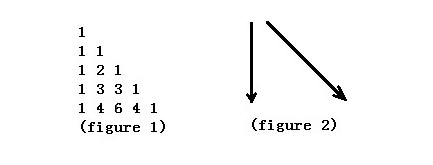HDU 3944 DP? [Lucas定理 诡异的预处理]
DP?
Time Limit: 10000/3000 MS (Java/Others) Memory Limit: 128000/128000 K (Java/Others)
Total Submission(s): 3126 Accepted Submission(s): 978
Problem Description

Input
Input to the problem will consists of series of up to 100000 data sets. For each data there is a line contains three integers n, k(0<=k<=n<10^9) p(p<10^4 and p is a prime) . Input is terminated by end-of-file.
数据范围诡异系列~
题意:杨辉三角可以往左或者往右走走到$(n,k)$的最小权值和
显然每一层都要取一个权值,并且越往外权值越小,当然是尽量往外最好啦
对称,k>n/2时变成n-k
如果从$(n,k)$向左斜着上去,结果就是
${n\choose k}+{n-1\choose k-1}+...+{n-k\choose 0}+n-k$
然后用组合数递推式合并,就是
${n+1\choose k}+n-k$
问题在于T太大啦,以致于<10000的质数远比T小,我们预处理模所有质数意义下的阶乘吧!
#include <iostream> #include <cstdio> #include <cstring> #include <algorithm> #include <cmath> using namespace std; const int N=10007; int n,m,P; bool notp[N]; int p[N]; void sieve(int n){ for(int i=2;i<=n;i++){ if(!notp[i]) p[++p[0]]=i; for(int j=1;j<=p[0]&&i*p[j]<=n;j++){ notp[i*p[j]]=1; if(i%p[j]==0) break; } } } int fac[N][1300],mp[N],pnum; void ini(int n){ sieve(n); for(int j=1;j<=p[0];j++){ int x=p[j];mp[x]=j; fac[0][j]=1; for(int i=1;i<=n;i++) fac[i][j]=fac[i-1][j]*i%x; } } int Pow(int a,int b){ int re=1; for(;b;b>>=1,a=a*a%P) if(b&1) re=re*a%P; return re; } int Inv(int a){return Pow(a,P-2);} int C(int n,int m){ if(n<m) return 0; return fac[n][pnum]*Inv(fac[m][pnum])%P*Inv(fac[n-m][pnum])%P; } int Lucas(int n,int m){ if(n<m) return 0; int re=1; for(;m;n/=P,m/=P) re=re*C(n%P,m%P)%P; return re; } int main(){ freopen("in","r",stdin); int cas=0; ini(10000); while(scanf("%d%d%d",&n,&m,&P)!=EOF){ if(m>n/2) m=n-m; pnum=mp[P]; printf("Case #%d: %d\n",++cas,(Lucas(n+1,m)+n-m)%P); } }
Copyright:http://www.cnblogs.com/candy99/


 浙公网安备 33010602011771号
浙公网安备 33010602011771号